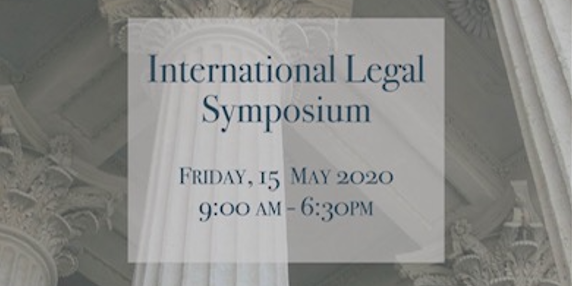Human Rights, the Sustainable Development Goals & the Law: Online Legal Symposium, hosted by Centre for International Sustainable Development Law (CISDL), invited leaders around the world to speak on and answer the following questions and topics:
Transformation: As an agenda for “people, planet, prosperity, peace and partnership”, the SDGs offer a paradigm shift from the traditional model of development, providing a transformative vision for post-pandemic measures that are people and planet-centred, human rights-based, and gender-sensitive. Why did your panel consider this shift to be essential?
Comprehensiveness: Alongside a wide range of social, economic and environmental objectives, post-pandemic measures which contribute to the SDGs will promote “more peaceful, just and inclusive societies which are free from fear and violence” with attention to democratic governance, rule of law, access to justice and personal security (in Goal 16), as well as an enabling international environment (in Goal 17 and throughout the framework). They cover issues related to all human rights, including economic, civil, cultural, political, social rights and the right to development. How did your session find a rights-based approach might strengthen post-pandemic measures to achieve the SDGs, in different countries – what were the worst and best examples that you discussed, and what can we learn from them?
Inclusion: Post-pandemic measures which contribute to the SDGs will leave no-one behind, envisaging “a world of universal respect for equality and non-discrimination” between and within countries, including gender equality, by reaffirming the responsibilities of all States to “respect, protect and promote human rights, without distinction of any kind as to race, colour, sex, language, religion, political or other opinions, national and social origin, property, birth, disability or other status.” How to design, develop and enforce international and domestic measures to advance the SDGs which fully respect and realise human rights – what is the advice of your session, going forward, who should be engaged, and how to start?
In the Trade, Investment & Financial Law Roundtable (SDG 9 – Industries, Innovation & Infrastructure and SDG 10 -Reduced Inequalities), Dr. James Collard, Director of Planning and Economic Development for the Citizen Potawatomi Nation (CPN) and Vice Chair in Business Development for International Inter-tribal Trade and Investment Organization (IITIO), shared his focus on developing mechanisms that actualize the principles of the UN’s SDGs, specifically, SDGs 9 and 10, and how Indigenous people have a crucial role to play in the linkage between the global economy and environmental sustainability.
Adv. Wayne Garnons-Williams, Chair and founding President of International Inter-tribal Trade and Investment Organization (IITIO), spoke on how Indigenous trading nations, through their Indigenous worldviews on giving back to the environment, are best suited to help nation states meet the Sustainable Development Goals, especially UNSDG’s 9, 10 and 11 that focus on industry, innovation, reduced inequality and sustainable communities. Garnons-Williams explained how Indigenous trade is already making choices to improve life sustainably for future generations by incorporating Indigenous ways to maintain business, such as the 7th generation principle to industrial development and the Indigenous circular economy.
Here is Adv. Wayne Garnons-Williams’ submission for the event:
The hard truth of Indigenous economic development cannot be forgotten:
There are approximately 476 million Indigenous Peoples worldwide, in over 90 countries. Although they make up over 6 percent of the global population, they account for about 15 percent of the extreme poor…[1]
Humanity has come to a cross-roads where there is an unmistakable climate crisis that is being fueled by our primitive lineal capitalist consumer economy. The earth can not environmentally sustain our current global economic model of disposable one-use consumption; significant wholesale change is needed in how we as a species value the environment, as our very existence depends on the human species acting beyond our own immediate self-interest.
The 2020 Global Risk Report states that Indigenous nations, through our unique experience, are best suited to help Nation States meet the international environmental goals:
… humanity relies on Indigenous communities to be stewards of ecosystems, protecting and preserving environmental resources. Indigenous peoples comprise of less than 5% of the world’s population but protect 80% of its biodiversity.[2]
For the human species to continue to survive, humanity needs to listen and learn from Indigenous people who possess and can share with the world our traditional knowledge of our philosophy of being, in a kinship relationship with the rivers, lands, plants and animals. For the next 1000 years we need to embrace more of this perspective, viewing human ‘wellbeing’ not from a capitalist, ever expansionist monetary perspective, but instead from an Indigenous perspective, such as Tikanga Máori (Maori) values, ethics, and culture.
This Tikanga Máori of living and practicing a balanced relationship between nature and humanity can be applied by Nation-States when they assign value to human ‘wellbeing’ in their overall Gross Domestic Product. An economic focus on the stewardship of living plants, animals and ecosystems, placing humans within a relationship with the environment (not over it) is essential for the long-term sustainability of both humanity and the environment. We humans must not merely take from Mother Earth’s bounty but also give back to her, so as to ensure a truly sustainable harvest, now and well into the future.






